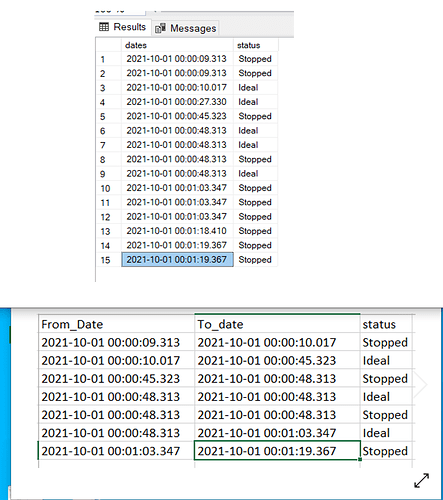My Table data & required report are :
CREATE TABLE [dbo].[test](
[dates] [datetime] NULL,
[status] varchar NOT NULL
) ON [PRIMARY]
GO
INSERT [dbo].[test] ([dates], [status]) VALUES (CAST(N'2021-10-01T00:00:48.313' AS DateTime), N'Ideal')
GO
INSERT [dbo].[test] ([dates], [status]) VALUES (CAST(N'2021-10-01T00:00:09.313' AS DateTime), N'Stopped')
GO
INSERT [dbo].[test] ([dates], [status]) VALUES (CAST(N'2021-10-01T00:00:27.330' AS DateTime), N'Ideal')
GO
INSERT [dbo].[test] ([dates], [status]) VALUES (CAST(N'2021-10-01T00:00:48.313' AS DateTime), N'Ideal')
GO
INSERT [dbo].[test] ([dates], [status]) VALUES (CAST(N'2021-10-01T00:00:10.017' AS DateTime), N'Ideal')
GO
INSERT [dbo].[test] ([dates], [status]) VALUES (CAST(N'2021-10-01T00:01:19.367' AS DateTime), N'Stopped')
GO
INSERT [dbo].[test] ([dates], [status]) VALUES (CAST(N'2021-10-01T00:01:03.347' AS DateTime), N'Stopped')
GO
INSERT [dbo].[test] ([dates], [status]) VALUES (CAST(N'2021-10-01T00:00:48.313' AS DateTime), N'Ideal')
GO
INSERT [dbo].[test] ([dates], [status]) VALUES (CAST(N'2021-10-01T00:00:09.313' AS DateTime), N'Stopped')
GO
INSERT [dbo].[test] ([dates], [status]) VALUES (CAST(N'2021-10-01T00:00:45.323' AS DateTime), N'Stopped')
GO
INSERT [dbo].[test] ([dates], [status]) VALUES (CAST(N'2021-10-01T00:01:03.347' AS DateTime), N'Stopped')
GO
INSERT [dbo].[test] ([dates], [status]) VALUES (CAST(N'2021-10-01T00:00:48.313' AS DateTime), N'Stopped')
GO
INSERT [dbo].[test] ([dates], [status]) VALUES (CAST(N'2021-10-01T00:01:18.410' AS DateTime), N'Stopped')
GO
INSERT [dbo].[test] ([dates], [status]) VALUES (CAST(N'2021-10-01T00:01:19.367' AS DateTime), N'Stopped')
GO
INSERT [dbo].[test] ([dates], [status]) VALUES (CAST(N'2021-10-01T00:01:03.347' AS DateTime), N'Stopped')
GO
